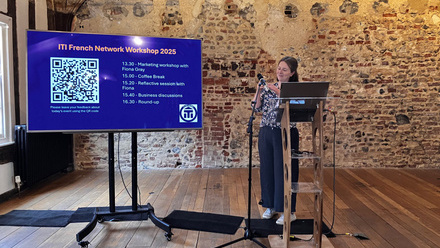A field of one's own
Much has been written about specialising, but where do you start and what do you need to do? Shelley Nix talks about what has made a difference for her.
We read a great deal about the importance of specialising, and increasingly it’s becoming essential (see Chris Durban’s feature in the November-December Bulletin). By focusing on a particular area, you are immersing yourself in that world, constantly building expertise and honing your skills. You can work more efficiently because you have an in-depth understanding and expertise in your selected area. And as a specialist, you can charge higher rates, particularly if you build up a particular area of expertise within a wider field.
But how do you go about identifying an area to specialise in and then developing and maintaining it? This article draws on my own personal experience (spanning almost 25 years) as a freelance medical and pharmaceutical translator. It shares what I have found most useful in improving my specialisation and advancing my career.
Getting a specialism started
Think about what you really enjoy, about what sparks and holds your interest and encourages you to learn more. This may even be a previous career or leisure activity. You will be spending a great deal of time and effort in your specialist area – learning, researching, investigating, translating – so you have to be completely engaged and stimulated by your subject to maintain that attraction and enthusiasm. In my case this was easy as I’d had an interest in medicine since childhood.
Once you’ve determined your specialist field, join the appropriate organisations, networks and support groups that can reinforce knowledge and expertise in that area. Translation organisations and associations generally, and ITI in particular, have subject and language networks that offer excellent opportunities to learn from colleagues working in similar fields and to participate in events and activities.
Many networks have dynamic, active e-groups that serve as platforms for asking questions, learning from answers provided by more experienced colleagues, and sharing information. Some offer mentoring schemes, ‘revision clubs’, webinars, and other training opportunities as well as bursaries. Volunteer to help in these groups: it’s an excellent way to expand your knowledge and forge new relationships with more experienced translators.
The ITI Medical and Pharmaceutical Network, for instance, usually organises workshops twice a year, inviting a medical professional to give talks on a particular subject. These one-day events also offer practical hands-on sessions in the afternoon where workshop participants separate into language groups to work on subject- specific texts. This has proved to be an excellent way for both experienced and new translators to learn and share expertise, knowledge and ideas. COVID-19 has inevitably changed this, so the network has adapted by offering a COVID-19- specific webinar and enhancing its existing online offerings, which provide reliable, MedNet peer- reviewed sources of information.
Working on your specialism
As you gain experience and develop your skills, you may find yourself fine-tuning your specialist area, or specialising within your specialisation. ‘Medical/pharmaceutical’ is an enormous field that includes patient reports, clinical trial documentation, journal articles, orthopaedics, medical devices, genetics, drug regulatory material, healthcare services, pharmaceutical manufacturingand packaging – the list is endless. You may find your way into a niche market where you can become even more highly specialised and maximise your earning potential and specific customer base.
It’s also vital, as you become increasingly expert and more recognised in your field, to uphold your own personal standards of quality. Over the past decade the translation profession has undergone profound changes and continues to do so. There is a much greater awareness of the idea of translation compared with a generation ago. Advances in technology have benefited the profession, certainly, but also pose challenges, as illustrated by the regular improvements in machine translation and aggressive market competition.
Highly experienced translators as well as newcomers are under greater pressure than ever. And with a persistent downward pressure on rates and ever tighter deadlines, quality has often suffered. This makes the argument for specialising and producing work of a high standard within that specialisation even more essential. In this environment, I think it is vital to keep your standards high, maintain your competitive edge and leverage your added value. You will also reinforce your own reputation, broaden your access to work opportunities and improve your earning capacity.
Owning your work
How do you ensure that you’re keeping to those high standards?
First of all, take personal responsibility: accept it, assume it, own it. This is your work. The translations you create are your finished product based on rigorous – and it must be rigorous – research and diligent effort. You must be able to answer for what you deliver to your client, be it an intermediate agency or direct client. Even established translators need to remember, too, that there is no room for complacency.
We are not just replacing words: we are communicating meaning. Check and cross-check your work or research. Check again. Ask colleagues who have more experience than you. Accept feedback from others. Be open to constructive criticism. None of us is right all the time.We continue to learn, and learn from our mistakes. This does not mean that you should roll over and play dead if what you have delivered is wrongly ‘corrected’, but if you are going to fight your corner you need to be able to justify your decision and substantiate your case. This can be achieved politely and professionally.
Know your limitations: only take on jobs you are confident you can handle. This is difficult if you’re just starting out and hungry for work and experience, and it’s certainly important to stretch and challenge yourself – but not to the extent that you accept a job you know you won’t be able to do properly. It pays to be honest and frank with clients (and yourself), particularly in the early stages of that partnership – clients will appreciate, respect and remember this. Always ask to see the text you are being requested to translate before you accept the job. Even if time is tight, you must look at the text and gauge as best you can if it’s for you.
However, if you have taken on something which turns out to be quite unlike what you thought when you first assessed it, and you realise you are in over your head, discuss the situation with your client as soon as possible and offer a solution if you can (for example, recommending a colleague who might be better suited to the job). Everyone can get themselves into a situation like that, even translators with many years of experience; it’s how you deal with it that makes the crucial difference.
And a note about using ‘technology’: CAT tools and similar can help us be more efficient, consistent and maintain quality, but passing straight machine translation off as original work is letting down the client, the translator, and the profession as a whole.
Remember community
That brings me to my final point: so much of my advice above adds up to don’t work in a vacuum. Personally, I feel this is essential. It’s easy to become ensconced in your own private world, hearing your own ‘translation voice’, doing the research and checking, certainly, but perhaps not running what may seem like straightforward translation equivalents by more experienced colleagues. ‘That sounds right,’ you might think, or ‘I found that term on these sites and it seems OK’.
Very often, however, it is not OK. And unfortunately, far too often the project manager, translation reviser or even end client will not know if the translation is accurate or good or even if it reflects what was wanted in the first place. They may not have an understanding of the source language, the target language or the nuances of either. They may not always understand the effort involved in researching a particular term or communicating an idea as effectively as possible in the target language. And some translators might think ‘The client doesn’t really care’ or ‘I’m really pressed for time and need to start the next job, so this version will be enough’.
But what happens when somewhere down the chain your translation is read by someone who does understand the meaning, the nuances, and the ideas behind the words and who does care? The fallout from that is going to find its way back to you, with potentially serious consequences.
At an intensive medical translation workshop I attended many years ago, someone asked our highly experienced and exceptionally talented teacher, ‘How can you take so much time, put so much effort into doing all that research?’ The response was, ‘How can you not?’ Indeed, how can you not? This is about your personal responsibility and everything that implies – and now more than ever.
Ask your colleagues and peers. Network e-groups are exceptional environments for posing questions, clarifying doubts, stimulating your thought processes, guiding you in the right direction, and more often than not, getting it right. I do not know of any other profession where colleagues are so unfailingly generous with knowledge and expertise and who share that so readily with newcomers and long-time translators alike. This is an exceptional resource that should be used.
If you call yourself a ‘specialist translator’, you must be able to substantiate that. We all have a professional obligation to our clients, our peers and ourselves in what we deliver as translators, and ultimately that is up to us.
This article first appeared in the January-Feburary 2021 edition of the ITI Bulletin
Never miss another Bulletin article

If you would like to read more features and articles on a wide variety of subjects relating to all aspects of the translation and interpreting industry, subscribe to ITI Bulletin. Alternatively, join ITI and get a free subscription included in your membership.







